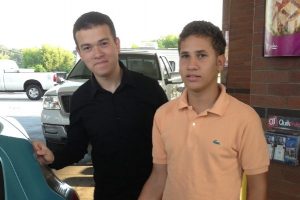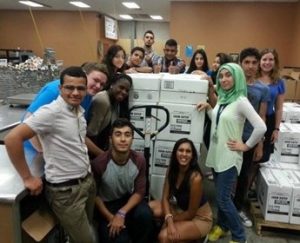-
What We Do
- WHERE WE WORK
-
About Us
 Welcome Message from Carol Jenkins
Welcome Message from Carol JenkinsFor more than 90 years, World Learning has equipped individuals and institutions to address the world’s most pressing problems. We believe that, working together with our partners, we can change this world for the better.
On my travels, I’ve had the opportunity to meet with many of those who have joined us in this mission. In Baghdad, we’ve trained more than 2,300 Iraqi youth who are already giving back at home. In London, our partners in the TAAP Initiative strongly believe that we are all responsible to practice inclusion. And in Vermont, our Experiment in International Living and School for International Training participants prove every day that they have the tools and the determination to change the world.
Please join us in our pursuit of a more peaceful and just world.
- Get Involved
Media Center > Story
The Truly American Benefits of Tulsa’s International Exchange Programs
April 6, 2017
Tulsa is an All-American city located in the heart of the country, but for some, its reputation as an international hub is growing. That’s the way Tulsa Global Alliance sees it, as expressed in its vision statement: “Tulsa is a vibrant community that thinks globally, acts globally and connects globally.”
Tulsa Global Alliance (TGA) builds global communities through its many exchange programs. According to Bob Lieser, Vice President of Programs, these exchanges enable us “to make powerful friends in vital countries.” He cites one famous example. When then Chinese Vice President Xi Jinping came to the U.S. in 2012 on an agricultural mission, he insisted on visiting his host family from 27 years earlier. Xi wanted to reconnect with the Iowa farmers and other residents he came to know then. Today, he’s the President of China.
“With that exchange program, he gained an understanding of what America is about and what Americans are like,” Bob says. “Given today’s tense international climate, this kind of experience is incredibly important for future cooperation.” In fact, he adds, 300 current or former heads of state have participated in exchange programs to America.
“As the new Defense Secretary James Mattis put it recently, ‘“If you don’t fund the State Department fully [which funds many international exchange programs], then I need to buy more ammunition ultimately.’ That’s a powerful statement.”
Bob also recalls a legislative fellow from Pakistan who initially didn’t want to visit the U.S. because she had such negative views of our country. “But at her delegation’s farewell dinner, she said she loved her host family and didn’t want to leave. Changing perceptions like this is so strategically important for the U.S.”
The Local Impact
Beyond the impact on international diplomacy and world peace, exchanges also provide significant and concrete benefits for hosts and host communities, including Tulsa.
The International Visitor Leadership Program, the State Department’s premier professional exchange, contributes between $700,000 and $800,000 a year to the Tulsa economy, and has contributed $30 million over the last 40 years. Exchanges also establish future business relationships and generate additional tourism.
Many of these exchanges are designed and implemented by World Learning, a nonprofit that oversees exchanges around the world. The organization taps its network of local partners, like the TGA, to find host families in the U.S. (more than 2,000 visitors a year).
Personal Impact
On a personal level, retirees Jim and Charlotte Langley, who have hosted guests since 2003, say the programs have enriched their lives in many ways.
“You’re making personal connections with people from around the world,” says Charlotte. We’ve made so many good friends and now, especially with Facebook, we don’t lose touch. We’re continually communicating with the girls and young women who have stayed with us from Iraq, Pakistan and other places. And they invite us to visit.”
In addition to providing a place to sleep, meals and some transportation, hosts also show visitors what it’s like to live in Tulsa, from cultural and sporting events to visits to the mall — which “they love” — to Sunday at church, where two young women agreed to answer questions for the children’s group, Charlotte says.
“Our guests have also cooked their home specialties for us, and one time, when we had a party for hosts and visitors, they moved the furniture to show us the dances they know from home. It was so much fun.”
One of the biggest surprises, she says, was how much they admire America. “I thought they’d be more negative, but it was the opposite. One Muslim girl even asked for a bible to read, which the Langleys were able to get for her in her native language.
“It’s so important for them to see how we live and vice versa,” Jim says. “It’s so important for both sides.”
More Similarities Than Differences
Carla Lynch, an assistant professor of nursing who has hosted five times, says the exchanges provide “the cultural experiences at home without having to travel. You begin to realize we’re all very similar, despite our differences, especially the kids, who just want to hang out and use their phones. Real people are not scary; they want a happy life, just like we do.”

Carla also says the experience has been invaluable for her kids. “It keeps them open at an early age,” she explains. “It tears down barriers, opens eyes and changes minds about what the world is really like, beyond the politics. It would be a huge mistake to cut these programs.”
Karen Smith, who has supported exchanges through the Community Service Council, has helped to coordinate trips to the state capitol and local museums.
She explained that a young woman from Pakistan wanted to visit a domestic violence shelter to learn how we deal with the issue in the U.S. When she saw a room for male victims, she was stunned that men can be abused, too. In her culture, this is not considered and there are not support structures of this kind available to male victims.
“Only by developing one-on-one relationships can we break down misunderstandings and stereotypes and build empathy and trust,” Karen says. “It’s harder to be negative or hurt people when you know them.”
Turn Up the Music
Leslie Melvin and her husband have hosted several potluck farewell dinners for 40 or 50 people, including teenagers from Iraq and Brazil.
 “We turn the music up and just have a good time,” Leslie says. “It’s a fairly bittersweet event, however, because at the end of the dinner, Bob Leiser hands out certificates to each visitor and invites them to say a few words if they choose. Everyone realizes the Tulsa part of the trip is coming to an end. We take group pictures and there are hugs all around.”
“We turn the music up and just have a good time,” Leslie says. “It’s a fairly bittersweet event, however, because at the end of the dinner, Bob Leiser hands out certificates to each visitor and invites them to say a few words if they choose. Everyone realizes the Tulsa part of the trip is coming to an end. We take group pictures and there are hugs all around.”
One of her fondest memories was when the ice bucket challenge was all the rage. “The Iraqi kids did the challenge in our backyard and it went viral to Iraq in minutes! It just showed us how small our world really is.”
“I’m constantly reminded how much more we have in common than what sets us apart. Teenagers are teenagers for the most part, no matter where they live. And families are families. We truly embrace the spirit of TGA and the idea of citizen diplomacy — helping to make the world a better place one handshake at a time.”





